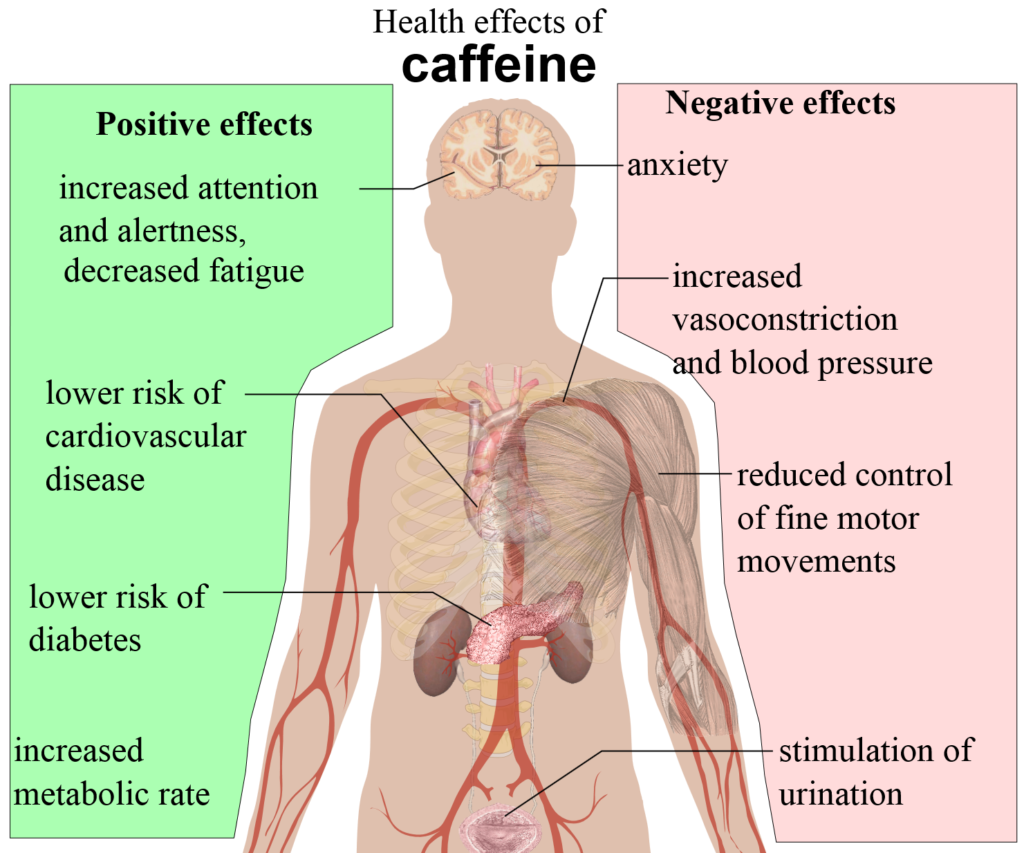The modern rhythm of life imposes us with too much obligations with constant rush and a lot of frustrations and a constant lack of time, all in order to get us to our goal. Our life is usually very messy, and we usually forget about the good and healthy eating habits, and we are under constant exposure to stress as we try to cope with all deadlines and responsibilities, eating on foot and making our exercise as trying to catch some public transport. We’re caught in a circle of bad habits and all these bad habits we water with various kinds of beverages that contain caffeine, usually in much bigger quantities than recommended and most of us reach for a well-known “means of maintaining life” – coffee in order to keep us awake!
Precisely because, when it comes to caffeine intake, most of us often think of a cup of coffee and we count only them. But even so that coffee isn’t the only way from which we may intake caffeine into our body, today I am writing about coffee.
Coffee: harmful or helpful?
About the health effects of coffee, there are many different opinions from how this is a very healthy drink to that coffee present an extremely harmful mixture. So what is the truth? The most accurate answer would be that both opinions are correct and that depending on the amount of ingested coffee it can be healthy but also harmful to our health.
Coffee contains antioxidants and they primarily serve to neutralize all toxic products, such as free radicals, which are produced in the body during the biodegradation processes of nutrients after we eat or drink something. Supporters of who prefer to drink coffee, agitate that caffeine has positive effect on the nervous system and now they can even support their belief on the research which was conducted and published in Harvard School Health department in which researches tract for 18-years and in which 65.000 women participated. In this prospective study, higher caffeine intake was associated with a lower risk of incident tinnitus (a steady ringing in the inner ear ) in women, and those who consumed less amount of caffeine (about one-and-a-half cups of coffee each day) were 15% more likely to develop tinnitus, than women who drank about 4-6 cups of coffee daily.
Intake of coffee makes us more awake and it also affects better functioning of the brain, coffee also influences on accelerated metabolic activity – caffeine stimulates the burning of fat by 3-4% but this is only a short-term effect that caffeine has. In moderate amounts, with intake of coffee our blood system calms down, but with higher consummation it affect on higher blood pressure. It must be noted that if you want to lose weight with the help of coffee it’s not a good idea because the effect of coffee on metabolism is only a short-term: our body becomes tolerant to caffeine which we entered so, this effect loses its original intention as a tool for dieting.
Also, there are those who are more sensitive to the effects of caffeine and such people may have different adverse reactions like for example the appearance of nervousness. People who have a rapid heartbeat or a tendency towards anxiety and depression should avoid coffee and all other beverages which contain caffeine.
In addition, too much caffeine can cause except reactions such as appearance of nervousness, also increased blood pressure or heart rate. People who have difficulties with sleep should avoid too much caffeine and accept that high intake of caffeine can even be a trigger for opposite effect when it comes to concentration and instead to stimulated it; it may lead to a drop in our concentration.
Have you ever wondered how many times you have heard someone say “I have a headache because I have not had my coffee” – it is because over time our body i.e. brain gets used to an increased intake of caffeine and if in such situation we do not enter it in sufficient quantity, than symptoms such as headaches, dizziness and even fatigue may appear. It is important to know that in such cases comes to pure physical dependence which occurs in the body when we miss some psychoactive substance on which we have addicted ourselves so we could function properly.
Caffeine is the most popular psychoactive substance in the world and we all know that the nature of any addiction is to seek an increasing intake of certain substances to which our body very quickly gets used to so, it would be able to “work” properly. Since caffeine causes addiction this is the main reason why some experts opposed any entries of coffee. On the other hand proponents for the consumption of coffee, explained that even caffeine may have symptoms of dependency as a result, caffeine is “addictive but not toxic,” and that the symptoms of the “removal” from excessive doses of caffeine last only a couples of days, so this is kind of dependency in a form in which each of us can easily wean.

If your habit is to intake more than 500mg of caffeine during a day, than you must really consider to cutting it off. Also the American Academy of Pediatrics recommends that adolescents shouldn’t intake more than 100mg of caffeine which presents approximately one cup of coffee during a day, and younger kids should avoid any intake of caffeine. In next table of content you will be able to see caffeine content in some types of coffee beverages. This presents just approximate measures because content of caffeine depends on many factors such as how long coffee beans were been dried and roasted.
| Type of coffee | Serving size present in ml | Caffeine content resent in mg |
| Brewed coffee | 8 oz or 237 ml | From 95 to 200mg |
| Brewed decaffeinated | 8 oz or 237 ml | From 2 to 12 mg |
| Espresso, restaurant style | 1 oz or 30 ml | From 47 to 75 mg |
| Espresso, restaurant style, decaffeinated | 1 oz or 30 ml | From 0 to 15 mg |
| Instant coffee | 8 oz or 237 ml | From 27 to 173 mg |
| Instant decaffeinated | 8 oz or 237 ml | From 2 o 12 mg |
| Specialty drink such as latte or mocha | 8 oz or 237 ml | From 63 to 175 ml |
So, if you are addicted to coffee there is no need to waive coffee, only try to manage its intake. For more health benefits always try not to add sugar in your cup of coffee. I hope you’ll find this useful and if you want help to research many more information about healthier lifestyle and how we can cope with stress you can order tailored research writing services in healthcare and nursing.

Dr Tanja Milenkovski is Nutritionist-Dietitian with more than a decade of practising experience. He has several journal publications in healthcare and diet.



